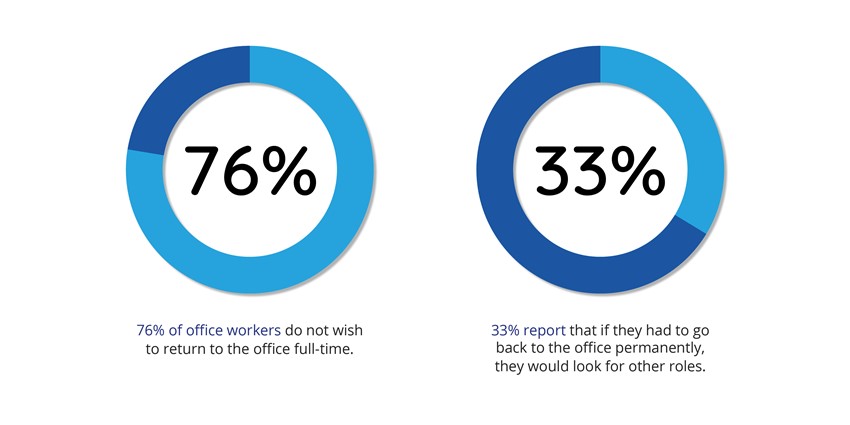How to boost employee morale in the workplace
Wondering how to boost employee morale in the workplace? Read our blog to find out how!

If the pandemic has taught us anything, it’s the importance of staying connected and the need to look after our wellbeing. As we come out of a third lockdown and continue to work from home, it’s clear that the past year has definitely taken a toll on our mental health.
With huge changes to the way in which we work, we studied the impact that working from home has had on people’s mental health, combining a survey with insight from an esteemed psychologist to answer some of the key questions around remote working and how people feel about going back to work.
We conducted a survey of over 2,000 UK residents. Two in five respondents (41%) indicated that their mental health has suffered more this lockdown than last Spring. Our research also revealed that 45% of us returning to work are feeling anxious, worried, stressed, or scared.
Associate Professor of Quantitative Social Psychology at Durham University, Mario Weick comments: “Many people have found the lockdown challenging and their mental health has suffered as a result. The survey shows that there may be a link between poor mental health and return-to-work anxiety. This makes sense because social withdrawal is a common consequence of poor mental health.”
Mario adds: “Also, the poorer respondents’ current work/life balance, the more respondents were inclined to experience return-to-work anxiety. Having a better work/life balance helps cope with stressors. For example, those workers who had to cope with an excessive workload during the pandemic might find returning to the office particularly challenging.”
So what can we do to combat the worry? Mario says: “People should familiarise themselves with any current health and safety measures that take into account latest changes in response to the pandemic. Knowing what exactly is happening can increase one’s sense of control, which in turn reduces anxiety.”
“It can also help to focus on the benefits of going back to work. For example, the workplace can provide an opportunity to connect with other people. Being physically present may help those who have struggled with isolation during the pandemic.”
Our survey revealed that 76% of office workers do not wish to return to the office full-time and a third (33%) report that if they had to go back permanently they would look for other roles. Over 23% reported that if they had to go back to the office permanently, they would consider leaving or resigning.

Over two thirds (68%) of us agree that UK businesses should give workers the choice to work from home or in an office where possible and of those, 41% say that it would improve the population’s mental health.
Mario states “There is evidence that increasing workers’ choice can lead to positive mental health outcomes. However, for this to translate into higher productivity, employees also need to have the right tools that allow them to be productive when working from home.”
Mario adds: “Flexible working arrangements that give workers more choice and control over their workplace are likely to have a positive impact on people’s wellbeing and mental health. They may also increase organisational level performance. However, flexible working is not without its challenges and can have drawbacks when the lines between work and one’s personal life become blurred.”
The pandemic has normalised remote working and we all know that work may never be the same. Even if we don’t yet know all the ways in which it will be different.
Mario comments: “I think the future of working will be more connected. Lines between the physical and the virtual world will become more blurred with new communication technology.
“I also think the future of work will be a place where people are more content and have a better work/life balance. In order to attract tomorrow’s talents, organisations will have to make sure the work they offer is purposeful and advances the common good.”
Through our research we wanted to highlight the importance of staying connected and the need for businesses to engage their people and empower them with the choice of whether they want to return to the office full-time or not.
Mario comments: “Work engagement is a positive, fulfilling, work‐related state of mind that is associated with positive mental health outcomes and work satisfaction. Engaged employees are less likely to suffer from burnout, and they benefit from better relationships inside and outside of work when compared to employees who are not engaged.”
However, Mario warns “working from home also has its challenges; especially during a pandemic it can be quite isolating. An increased reliance on emails can be problematic, and it can increase workload and lead to misunderstandings with colleagues.”
Products like our intranet software can help businesses connect their people, boost employee engagement and promote wellbeing, giving everyone a voice at a time when they need it most. This will be key now that the majority of people will want some sort of flexible working situation going forwards. Find out more by booking a demo today.
Methodologies
Survey
The research was conducted by Censuswide on behalf of Oak Engage, with 2,016 participants from a nationally representative sample of UK adults aged 16+ across the UK between 26/03/2021 - 29/03/2021.
Wondering how to boost employee morale in the workplace? Read our blog to find out how!
Knowing how to manage difficult employees sensitively and effectively is key to avoid large scale impact on team morale, job satisfaction and individual wellbeing at work.
Oak Engage is recognised as a leader in the 2025 ClearBox report. We are delighted to have increased our scores yet again in 5 out of 8 categories.